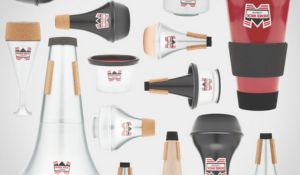Denis Wick Mutes: A Spectrum of Sound

.png?width=4000&height=1455&name=Spectrum%20of%20Sound%20(1).png)
When someone says to you, "Mute It!" their end goal is for silence. In the world of brass playing it has nothing to do with silence, and everything to do with sound enhancement.
A painter has a palette of colors to slightly change, and adjust the 1 shade of blue into a warm summer sky or a frigid ocean in a snow storm. As a musician, we have 2 ways to manipulate sound: physically by adjusting our embouchures and air, or by using mutes. I don't know about you, but I would definitely choose the mute option.

Why do we need to manipulate our sound?
Our most direct orders come from the composer. But why is the composer asking for a straight mute or cup mute in a specific area? It's not because they necessarily like the sound of a straight mute. The sonic environment they are trying to create requires a slightly different shade of "trumpet", or a less bold shade of "Trombone", or a more neon shade of French Horn.
Get our newest tips, updates, videos, clinics, community events, and more by joining Denis Wick Tips Blog
Become the painter.
You need to know your mute colors better than the composer. In the Denis Wick "spectrum of mutes" You have straight mutes that are more atmospheric, and straight mutes that will project to the back of the hall. Which is most appropriate? Will it be a wooden mute that will match the timbre of the clarinetist you are playing a solo with, or are you performing Perkofiev 5 and your straight mute is required to cut through the orchestra to the back of the hall? These are choices you need to make.

Beyond the music.
These mutes are not just tools for composers. When a conductor finds the brass section at their limit for pianissimo, and you are still getting the hand, a practice mute might give you the space to play a little more confidently but stay in the dynamic range your conductor requires. You might need to blend with a different instrument that is requiring you to physically adjust your sound, where a mute might do the job for you.
Prepare to Play.
Spend some time each day, or at least a few days a week playing your mutes. Mutes slightly change the response, and sometimes tuning, of your instrument, so preparing to quickly adjust to these differences will make you a stronger performer. The only difference the best performers, most successful performers, share with you sometimes is their knowledge of the tools that make their job easier. The better you know all your tools and how to use them, the easier your job as a performer gets.

Find all our Denis Wick resources in one spot on the Denis Wick app. Download to view videos, clinics, educator resources, podcasts, product information & more!



